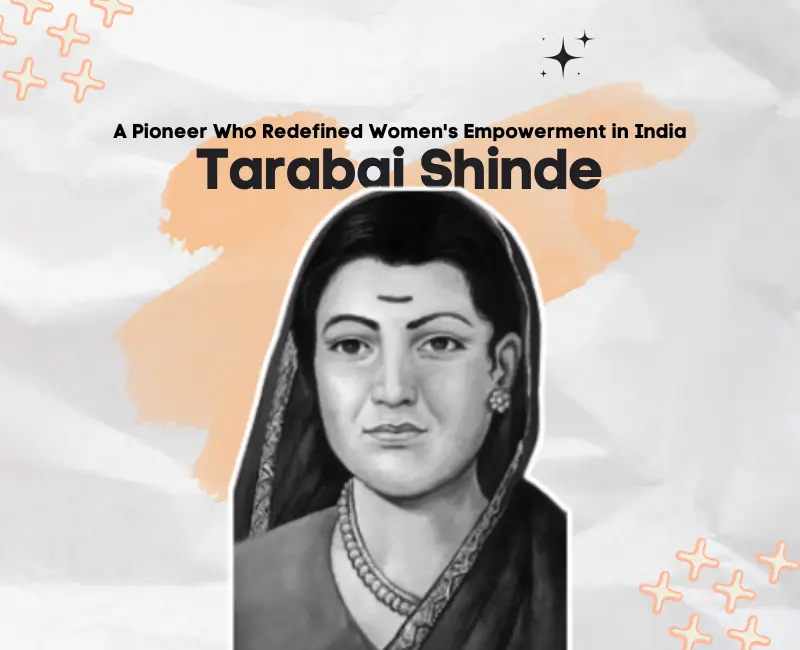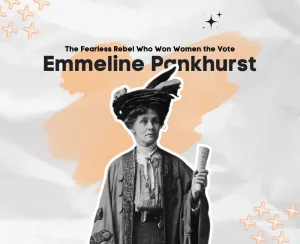Tarabai Shinde: A Pioneer Who Redefined Women’s Empowerment in India

In the modern world, we talk a lot about women’s empowerment and gender equality, but it wasn’t always like this. In the past, women were respected as mother goddesses, but over time, their role in society diminished to that of household caretakers. By the 19th century, women had no access to education and were denied basic rights. Forced marriages, widowhood and sexual violence were common within the households.
Amid this dark phase, a courageous woman who became the voice of Feminism in 19th Century India was Tarabai Shinde. Tarabai Shinde was a fierce and visionary pioneer who spoke up about feminism and women’s rights. Through her writing, she challenged the mistreatment of women and highlighted the need for gender equality. In this blog, we are going to discuss Tarabai Shinde biography and her contribution to redefining women rights and life.
Who was Tarabai Shinde – Early Life and Influences
Tarabai Shinde was a bold and visionary feminist, social reformer, and writer born in 1850 in Buldhana, Maharashtra. While Tarabai Shinde’s date of birth remains unclear, her contributions to women’s rights and equality have left a lasting impact. In the 19th century, she was one of the few women who spoke for women’s rights, gender equality and the right to education. By criticizing gender roles and social injustices in a society that silenced women, she became a voice for feminism. Her revolutionary thinking and advocacy for women rights marked a turning point in gender equality, inspiring feminists and reformers worldwide.
Early Life
Tarabai Shinde was born into a period when society mostly confined women to the home and domestic sphere. However, Tarabai Shinde’s early life was very different from that of the rest of the women of that period. In a society where women’s education and freedom were limited, she was an exception. Her father was an educated radical and head clerk with modern, progressive and revolutionary thinking. When women had no access to education, Tarabai Shinde’s father decided to educate her. There were no schools for girls in the area, therefore her father taught her Marathi, Sanskrit, and English himself.
However, she got married at a very young age, as child marriage was common in the 19th century. Despite her early marriage, her life was different from that of other married women. She was granted more freedom than most Marathi Wives since her husband became “Ghar Jamai” and shifted to her residence. Tarabai Shinde’s progressive ideas and revolutionary lifestyle set her apart and fueled her thoughts.
Influence of Social Reform Movements
The social reform movements in 19th-century India, led by Jyotirao Phule and his Satyashodhak Samaj, had a significant influence on Tarabai. Her exposure to progressive ideas shaped her perspectives on gender and social justice and fighting caste discrimination. Another big influence was Raja Ram Mohan Roy, who challenged practices such as child marriage, Sati, suppression of women, etc. These movements laid the groundwork for Tarabai Shinde to strengthen her views and voice on gender inequality and women’s rights.
The biggest influence on Tarabai’s journey towards gender equality and women empowerment was the Vijayalakshmi case in 1881. Vijaylakshmi was a Brahmin widow who had aborted her illegitimate child. Killing a child was a big issue, and she was convicted for the same. It became a huge topic at that time and was taken to court and the government. She was sentenced to death, but after repeated appeals, her punishment was reduced to transportation for life.
People believed it was a great sin for a widow to become pregnant. However, Tarabai Shinde strongly opposed this idea and showed great respect for young widows. She believed they should have the right to make their life choices, including the decisions to abort a child, and remarrying.
Tarabai Shinde Contribution – Social Work
Tarabai Shinde actively participated in various social reform movements that were focused on women’s rights and equality. She worked with social activists Jyotirao and Savitribai Phule, who were the founding members of their Satyashodhak Samaj organization. The organization focused on promoting equality and fighting social injustices, gender inequality and lack of women’s rights. In 1848, they also established a school for girls from the untouchable caste and a shelter for widows prohibited from remarrying in 1854. Tarabai actively participated in both initiatives, gaining deeper insights into the struggles faced by women. Her experiences with prevailing social issues deeply shaped her understanding of gender and caste oppression.
Tarabai and Phules discussed and raised awareness on how caste and gender inequality are interconnected.
Tarabai Shinde Book: Stree Purush Tulana
In response to the Vijayalakshmi case in 1881, in 1882, Tarabai Shinde published a book named Stree Purush Tulana in Marathi. In her book, Tarabai raised a lot of questions about women’s rights, gender inequality, injustice to women, and unjust practices. She even opposed child marriages, polygamy, and forced marriages. In Stree Purush Tulana, she spoke about:
Critique of Gender Hierarchies
Tarabai Shinde critically examined the oppressive practices that suppressed women in society and criticized them. She challenged the dominance of men over women and highlighted gender hierarchies. By placing “stree” before “purush” in her book’s name, she not only rejected the hierarchy but also challenged it. She criticized narrow literature works like Muktamala, Stricharita, and Manorama for defining gender roles unequally.
Maltreatment and Discrimination Against Women
The book discussed the maltreatment of women and addressed issues like sati, social discrimination, inequality, and lack of education for women. She questioned how a woman is always categorized between good women and the prostitute state. Her unfiltered analysis of these injustices made Tarabai Shinde’s book the most outstanding contribution to feminist literature.
Widowhood and its Injustices
Tarabai also brought attention to the harsh treatment of widows, including their lack of rights and opportunities for remarriage. She questioned why women were forced to lead an isolated, unhappy and abandoned life after their husband’s death. She also criticized the practice of depriving widows of their ornaments and shaving their heads, stripping them of their sense of beauty. In her book, she also advocated and favors widow remarriage strongly.
Marriage, Religion, and Societal Expectations
Tarabai exposed the systemic oppression women faced, particularly in marriage, religion, and societal expectations. She criticized how religious texts dictated how women should think, act, and behave. Tarabai opposed the unequal treatment of women in marriage and their association with just household chores. She also questioned the society on how it expects a woman to live an isolated life while men can enjoy all the privileges.
Challenge Male Superiority
Stree Purush Tulana challenged the male superiority and criticized men for failing to keep their wives happy. It points out how men have the freedom to remarry after their wife’s death, but no such freedom is given to women. The book emphasized gender equality, arguing for women’s rights and challenging male privilege. She fearlessly questioned the double standards of the society in treating women.
Women’s Right to Education
Tarabai was a firm believer of “Education is important to everyone irrespective of gender”. She stated and demanded that every girl and woman should be educated and well aware of her rights. She claimed that education will help women to face the situations boldly and act in the right manner. Tarabai also pointed out education is the only weapon to break social norms and superstitions and bring a change. Education will help women to make decisions, understand their conditions and chart their lives in a better way. This can lead to a big change, making women’ lives better and independent.
Backlash and Struggle for Recognition
Tarabai Shinde Stree Purush Tulana was published in 1882 by Shri Shivaji Press, 500 copies at 9 annas. However, soon after its release, it shook the orthodox community and caused a storm in the male-dominated society. Even after being such a revolutionary book, it received a lot of backlashes. It became subject to immense condemnation and hostility and was clamped down. Due to its questioning for men and supporting women, it was hidden for a long time as no other publication was ready to publish it.
Moreover, the local newspapers ran multiple targeted articles ridiculing the book and her work. Even some social reformers, including colleagues of Jyotiba Phule, condemned her, forcing Tarabai to disappear from the public eye. Later, Jyotiba Phule supported her work in the second issue of her magazine, Satsar and lauded her views.
Eventually, in 1975, S.G. Malshe re-published it, and Rosalind O’Hanlon translated it into English in 1994. It became the voice of women and their rights, laying the foundation for feminist thought in India.
Impact of Tarabai Shinde’s Writings
Although Stree Purush Tulana did not gain widespread attention during Tarabai’s lifetime, it holds a special place in Indian feminist literature. Tarabai Shinde’s book was revolutionary, which sparked a feminist movement in India. It encouraged a lot of women to fight for their rights, oppose injustice and demand equality and education. Her book challenged established patriarchal structures by raising concerns about gender inequity. Her outspoken language and unapologetic tone questioned deeply rooted conventions while inspiring future generations of activists and authors. Her work laid down the foundation for future activists to fight for women’s rights and equality. Today, her work is regarded as a forerunner to the feminist movements that emerged in India during the 20th century.
Conclusion
Tarabai Shinde was not just a writer; she was a pioneer who dared to question the society about gender inequality, and women rights. She was the first woman to become the voice of women and laid down a strong foundation for feminism in India. Through her book, Stree Purush Tulana, she raised her voice on a lot of issues women faced and challenged male privilege. Her book became the talk of the town and shaked the orthodox reformers. Her unfiltered and unbiased stand challenged injustice and empowered voices that demanded equality. In a nutshell, Tarabai Shinde was a revolutionary feminist who spoke for women and their rights when they were silenced and suppressed.


